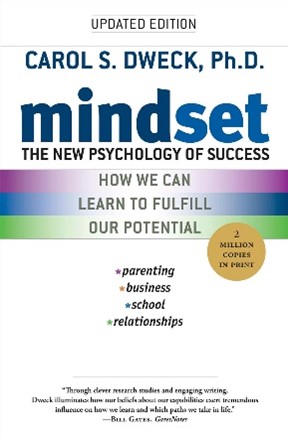The Growth mindset leads to long-term success

Have you ever heard “Fixed mindset” and “Growth mindset”?
These terms were proposed by Carol Dweck, an American Stanford University psychologist. These two terms were popularized in her book published in 2006; “Mindset: The New Psychology of success”.

〈Carol S. Dweck, Ph. D.:“Mindset: The New Psychology of Success”〉
Fixed mindset indicate that human resource and its talent are static. Human ability won’t change easily and those people who have this mindset feel more comfortable to be in easy circumstances. They’ll be faced difficulties when they have to accept own mistakes or failures. In other words, they are concerned with maintaining the status, and stick to the results of the external influences. This fixed mindset has something in common with “Extrinsic motivation” in education.
The motivation of the students joining the Japanese compulsory education, is almost always “I want to be pleased by teacher” or “I want to enter university which is high rank in Japan (or in the world)”, or “I want to get a job in a popular company”. They often try to maintain their desire to learn and motivation through the desire for “rewards” associated with learning outcomes. Although such extrinsic motivation can arouse the desire to compete and encourage learning, there is a strong possibility that once they realize that they won’t be rewarded for their achievements, they’ll quit the activity itself. Therefore, it can be said that extrinsic motivation and fixed mindset are similar in that they are based on external factors other than themselves.
The other term, growth mindset is much similar to “Intrinsic motivation”. These people believe that they can expand their knowledge and ability. They won’t lose their confidence but they see mistakes as the opportunity to grow themselves, and they also can take difficult challenges bravely. Intrinsic motivation refers to the desire for learning itself, such as an individual’s simple interest or “I want to do this”. Intellectual curiosity such as “I want to know about this” or “I want to solve this question” are also one of the important essences of intrinsic motivation. Those who choose actions based on the intrinsic motivation find value in learning itself, continue learning, and also increase the efficiency of learning. I think there are some points in common with the growth mindset.

In 2014, Dweck herself gave a TED Talk in which she analyzed children’s brains when faced with a difficult challenge and found that only the brains of children in the “growth mindset” were active. In other words, “neurons,” which are specialized cells in the brain for information transmission and processing, created new and stronger connections. Scientifically, the study proved that the growth mindset makes it possible to develop and nurture human abilities.
Although, the benefit of a “growth mindset” is described above, Japanese public education, which has more than adequately focused on extrinsic motivation, has indirectly produced a large number of people with a “fixed mindset”. I believe the number of “growth mindset” individuals will increase dramatically when it’s combined with education that encourages intrinsic motivation. However, the shift from a fixed mindset to a growth mindset goes against the way of thinking that has prevailed in Japan up to the today’s society, and a breakaway from it will not be achieved without effort.
In this age of AI technology, the most required ability of us “human being” is not the simple ability to systematically transmit knowledge and technology, but the “ability to create something from scratch”. Modern society is overflowing with more information than “human being” can process, but it is essential to develop the ability to grasp and logically consider only the necessary information from both the information that appears in society and the information that does not. One of the hints to make this possible is the shift to a “growth mindset,” which is proposed by Carol Dweck.
Our institute, we call the ability to read the meaning of public information and derive the future through scenario planning “information literacy”. We help our members improve their information literacy on a daily basis through our membership service, and provide university students a place to help them develop this ability at no cost, as one of our social contribution activities.
The explosive growth of data distribution is ironically crippling our lives. I would like to promote a strong growth mindset and an eagerness to learn, rather than living on someone else’s point of view while being buried in an enormous amount of information.
Corporate Planning Group, Maria Tanaka



